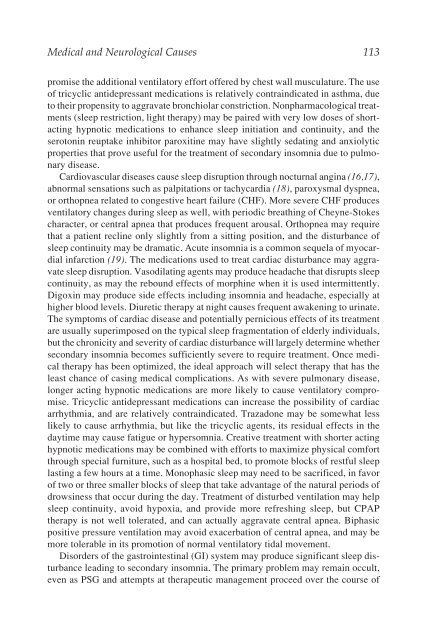Insomnia Insomnia
Insomnia Insomnia
Insomnia Insomnia
Create successful ePaper yourself
Turn your PDF publications into a flip-book with our unique Google optimized e-Paper software.
Medical and Neurological Causes 113<br />
promise the additional ventilatory effort offered by chest wall musculature. The use<br />
of tricyclic antidepressant medications is relatively contraindicated in asthma, due<br />
to their propensity to aggravate bronchiolar constriction. Nonpharmacological treatments<br />
(sleep restriction, light therapy) may be paired with very low doses of shortacting<br />
hypnotic medications to enhance sleep initiation and continuity, and the<br />
serotonin reuptake inhibitor paroxitine may have slightly sedating and anxiolytic<br />
properties that prove useful for the treatment of secondary insomnia due to pulmonary<br />
disease.<br />
Cardiovascular diseases cause sleep disruption through nocturnal angina (16,17),<br />
abnormal sensations such as palpitations or tachycardia (18), paroxysmal dyspnea,<br />
or orthopnea related to congestive heart failure (CHF). More severe CHF produces<br />
ventilatory changes during sleep as well, with periodic breathing of Cheyne-Stokes<br />
character, or central apnea that produces frequent arousal. Orthopnea may require<br />
that a patient recline only slightly from a sitting position, and the disturbance of<br />
sleep continuity may be dramatic. Acute insomnia is a common sequela of myocardial<br />
infarction (19). The medications used to treat cardiac disturbance may aggravate<br />
sleep disruption. Vasodilating agents may produce headache that disrupts sleep<br />
continuity, as may the rebound effects of morphine when it is used intermittently.<br />
Digoxin may produce side effects including insomnia and headache, especially at<br />
higher blood levels. Diuretic therapy at night causes frequent awakening to urinate.<br />
The symptoms of cardiac disease and potentially pernicious effects of its treatment<br />
are usually superimposed on the typical sleep fragmentation of elderly individuals,<br />
but the chronicity and severity of cardiac disturbance will largely determine whether<br />
secondary insomnia becomes sufficiently severe to require treatment. Once medical<br />
therapy has been optimized, the ideal approach will select therapy that has the<br />
least chance of casing medical complications. As with severe pulmonary disease,<br />
longer acting hypnotic medications are more likely to cause ventilatory compromise.<br />
Tricyclic antidepressant medications can increase the possibility of cardiac<br />
arrhythmia, and are relatively contraindicated. Trazadone may be somewhat less<br />
likely to cause arrhythmia, but like the tricyclic agents, its residual effects in the<br />
daytime may cause fatigue or hypersomnia. Creative treatment with shorter acting<br />
hypnotic medications may be combined with efforts to maximize physical comfort<br />
through special furniture, such as a hospital bed, to promote blocks of restful sleep<br />
lasting a few hours at a time. Monophasic sleep may need to be sacrificed, in favor<br />
of two or three smaller blocks of sleep that take advantage of the natural periods of<br />
drowsiness that occur during the day. Treatment of disturbed ventilation may help<br />
sleep continuity, avoid hypoxia, and provide more refreshing sleep, but CPAP<br />
therapy is not well tolerated, and can actually aggravate central apnea. Biphasic<br />
positive pressure ventilation may avoid exacerbation of central apnea, and may be<br />
more tolerable in its promotion of normal ventilatory tidal movement.<br />
Disorders of the gastrointestinal (GI) system may produce significant sleep disturbance<br />
leading to secondary insomnia. The primary problem may remain occult,<br />
even as PSG and attempts at therapeutic management proceed over the course of


